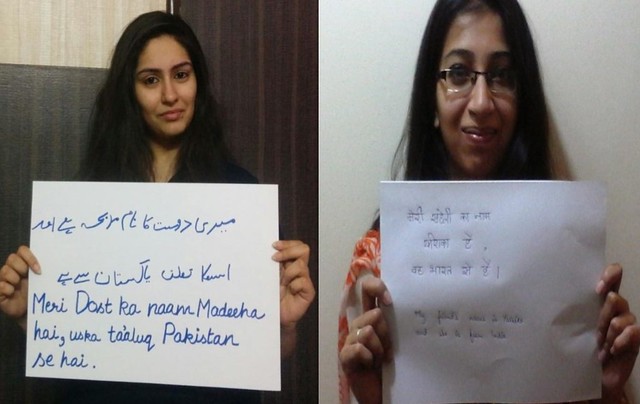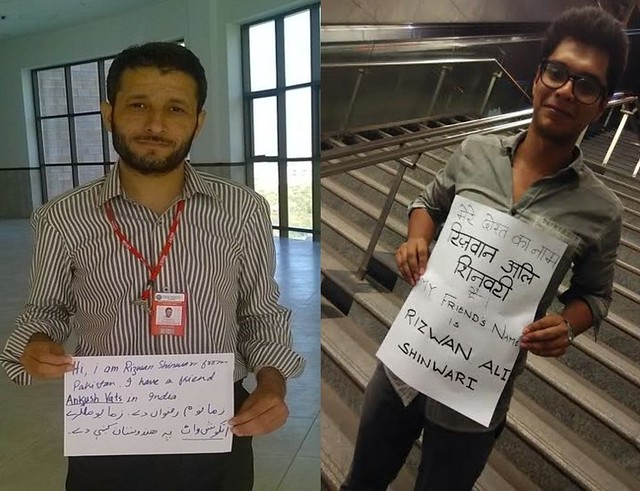By TCN News,
New Delhi: With the aim to facilitate people-to-people communication and create a culture of mutual respect and understanding, Aaghaz-e-Dosti has launched a new initiative called ‘’ Friends Beyond Borders’ to facilitate bonds of friendship and understanding between Indians and Pakistanis.
‘Friends Beyond Border’ is an eight-week virtual peace building course wherein an Indian and a Pakistani has been paired to be ‘Indo-Pak E-Pals’. Through this eight-week interactive course, the fellows or the Indo-Pak E-Pals are guided by a mentor, who gives them weekly plans/activities based on a curriculum designed to familiarize them with the ‘other’, its culture, society, politics and the existence of divergent narratives. It aims to develop critical thinking, acceptance and respect for differences in order to celebrate similarities with a belief in peace and friendship as the sane way forward, a release by Devika Mittal, convener (India) of Aaghaz-e-Dosti, said.

Madeeha Dogar and Yashika Pahwa
For the first session, Aaghaz-e-Dosti received a total of 80 applications from people of both countries. Applications came from different parts of India and Pakistan which included major as well as smaller cities and towns. The applicants varied in terms of their age and profession. The applicants also differ in terms of their motivation to join the course. While there were some for whom this would be the first attempt to reach out to people across the border, to know about the culture, many, Muhammad Zuhaib Arain from Hyderabad (Pakistan) being one of them applied because he carries an emotional bond. Zuhaib’s grandparents had migrated from Amritsar, it said.
Preference was given to people who had no friends beyond the borders. The selected fellows are Akshay Mankar, Anjali Katoch, Ankush Vats, Aasma Pratap Singh, Aamir Bin Masood, Fayaz Shaikh, Guneet Singh, Jasmine Singh, Madhavi Bansal, Muddasir Hassan, Manish Harish Yadav, Preeti Kumari, Richard Joseph Salafia, Yashika Pahwa from India and Adil Ahmad Dayo, Awais Mumtaz, Ch Faisal Mehmood, Faisal Latif, Fatimah Shah, Imtiaz Akram, Madeeha Dogar, Mohammad Saad Farooqi, Mohammad Zuhaib Arain, Nihal Tabbussum, Rizwan Ali Shinwari, Sadaf Kashif, Salma Noureen, Zaman Bhatti from Pakistan.
The fellows come from Delhi, Chattisgarh, Punjab, Haryana, Vadodara, Mumbai and Pune in India and Lahore, Rawalpindi, Islamabad, Peshawar, Federally Administered Tribal Areas (FATA), Karachi and Hyderabad in Pakistan. Their occupations include college students, research students, advocates, journalists, NGO workers, activists and businessmen.
The Indo-Pak E-Pals are guided by mentors. The mentors of the first session are Abdur Rauf Yousafzai, Aliya Harir, Imrana Qasim, Sehyr Mirza, Suraiya Islam and Syed Zeeshan Ali Shah from Pakistan and Devika Mittal, Ilma Iqbal, Madhuri Mittal, Madhavi Bansal, Madhulika Narasimhan, Sirish Agarwal and Shruti Achesh from India, the release said.
On the role of media, Akshay Mankar from Chattisgarh and Salma Noureen from KPK wrote, “If we ignore the TRP part, Indian media is always highly suspicious of Pak, which we cannot altogether label as hoax, but the continuous dose “do not trust Pak” to the public is rather not good and a big hurdle in peace process as the nation is democratic and if people’s view are negative, their representatives too, cannot take any substantial, and daring step in order to bring peace or negotiate or make compromises for peace.

Rizwan Ali Shinwari and Ankush Vats
Likewise, the Paki media is always in the illusion that Indian military strength is an offensive one and is developed by keeping Pakistan in view, which is not at all true. Though they are not as aggressive as the Indian media, but they misunderstand India in all possible ways. They repeat the rhetoric of India being an existential threat, questions upon Indian secularism and Indian democracy repeatedly and thus qualifies as the only media to question those things.”
In their joint report on who benefits from peace, Awais Mumtaz from Lahore and Preeti Kumari from India wrote: “The beneficiary of peace is the general public. Peace is beneficial for everybody, for the fuller development of all individuals. Peace ensures the value and protection of life, which is the ultimate goal of humanity. So in this sense, peace benefits the general public like us who never want to indulge in wars but promote the sense of brotherhood and serenity on both sides.”

